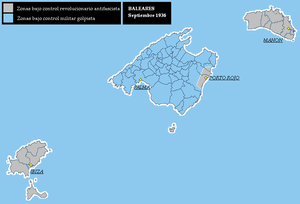Battle of Majorca
| Battle of Majorca | |||||||
|---|---|---|---|---|---|---|---|
| Part of the Spanish Civil War | |||||||
 Map depicting the height of the offensive in the Balearics, with Minorca, Ibiza, Formentera, Cabrera, and eastern Majorca all under Republican control (in gray). |
|||||||
|
|||||||
| Belligerents | |||||||
|
|
|
||||||
| Commanders and leaders | |||||||
|
|
|
||||||
| Strength | |||||||
| 8,000 militia 1 battleship 1 light cruiser 2 destroyers 3 submarines 10 guns |
3,500 regulars and militia 3 bombers 3 fighters |
||||||
The Battle of Majorca, also known as the Majorca Landings, was an amphibious landing early in the Spanish Civil War aimed at driving the Nationalists from Majorca and reclaiming the island for the Republic. After some initial tactical success, the expedition, commanded by Captain Alberto Bayo, ended in failure when the Nationalists counterattacked with ground troops and massively superior air power and drove the Republicans into the sea. So confident were the Republicans in their prediction of victory they optimistically called the operation "la reconquista de Mallorca" - "the reconquest of Majorca".
Plans for a seaborne attack on the Balearic Islands seem to have surfaced independently in various Republican militia groups in the days following the joining of Ibiza, Formentera, and Majorca to Franco's Nationalist military rebellion. Already, on July 23, bomber squadrons struck Palma and Cabrera, and on August 1, a Republican expeditionary force from Minorca landed at Cabrera and resisted all efforts to dislodge it.
These actions, however, and in particular the Majorca landings, were never approved by the Madrid government and had from the very beginning an air of confusion and improvisation. On August 2, Bayo assembled a column of Barcelona militia on Minorca; the next day, the Republican air force dropped bombs on Palma once more. By August 6 logistical preparations, overseen by the Barcelona government and the Council of Catalan Antifascist Militias (Comitè Central de Milicies Antifeixistes de Catalunya), were complete.
The Nationalist garrison of Formentera capitulated to Manuel Uribarri's Valencian militia on August 7. On the 13th, 400 Catalan militia occupied Cabrera in an assault apparently unrelated to Bayo's expedition. Bayo tried to coordinate the two forces but the anarchist militias, distrustful of his Communist sympathies, refused to commit themselves to his operation.
...
Wikipedia
